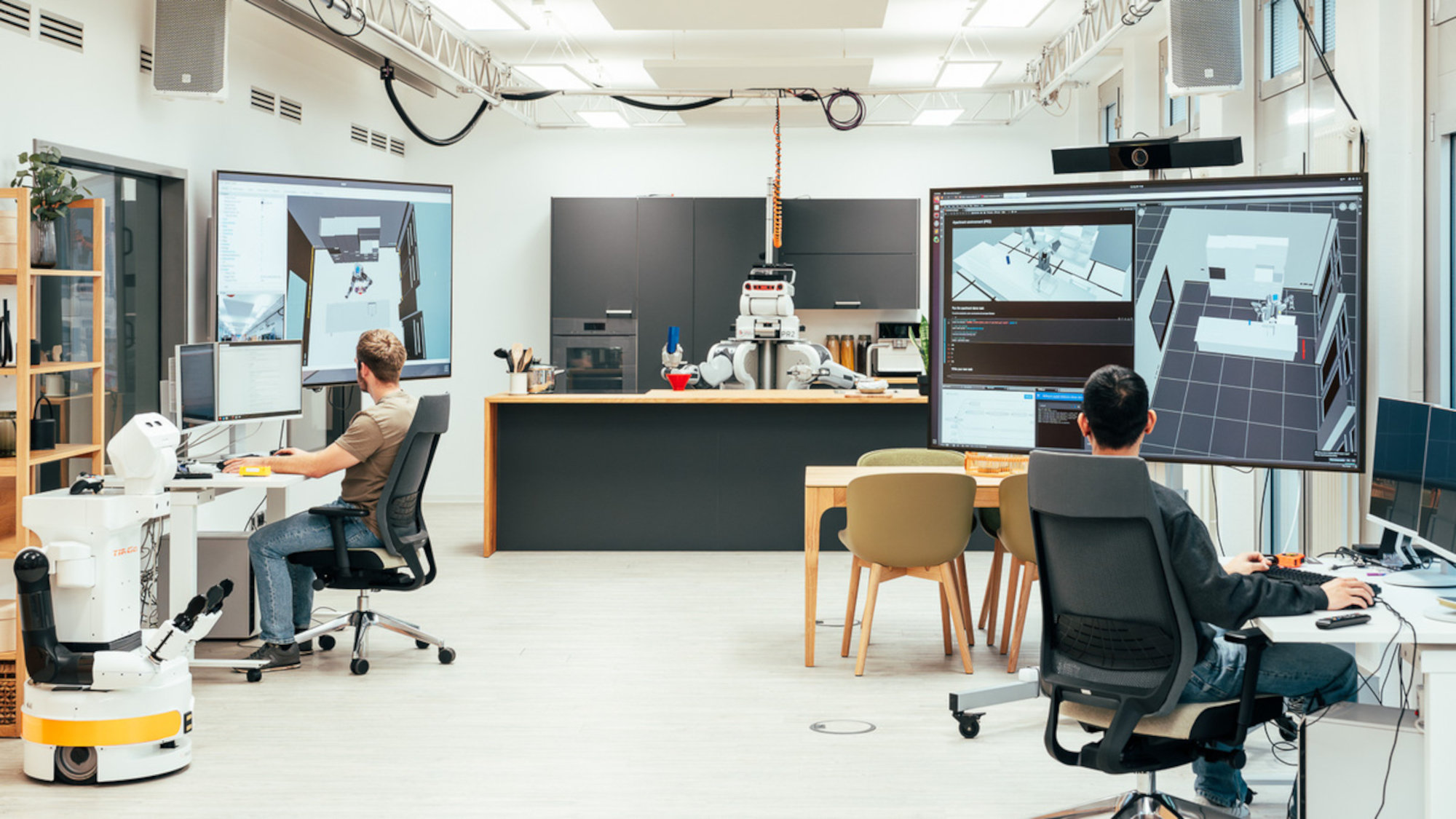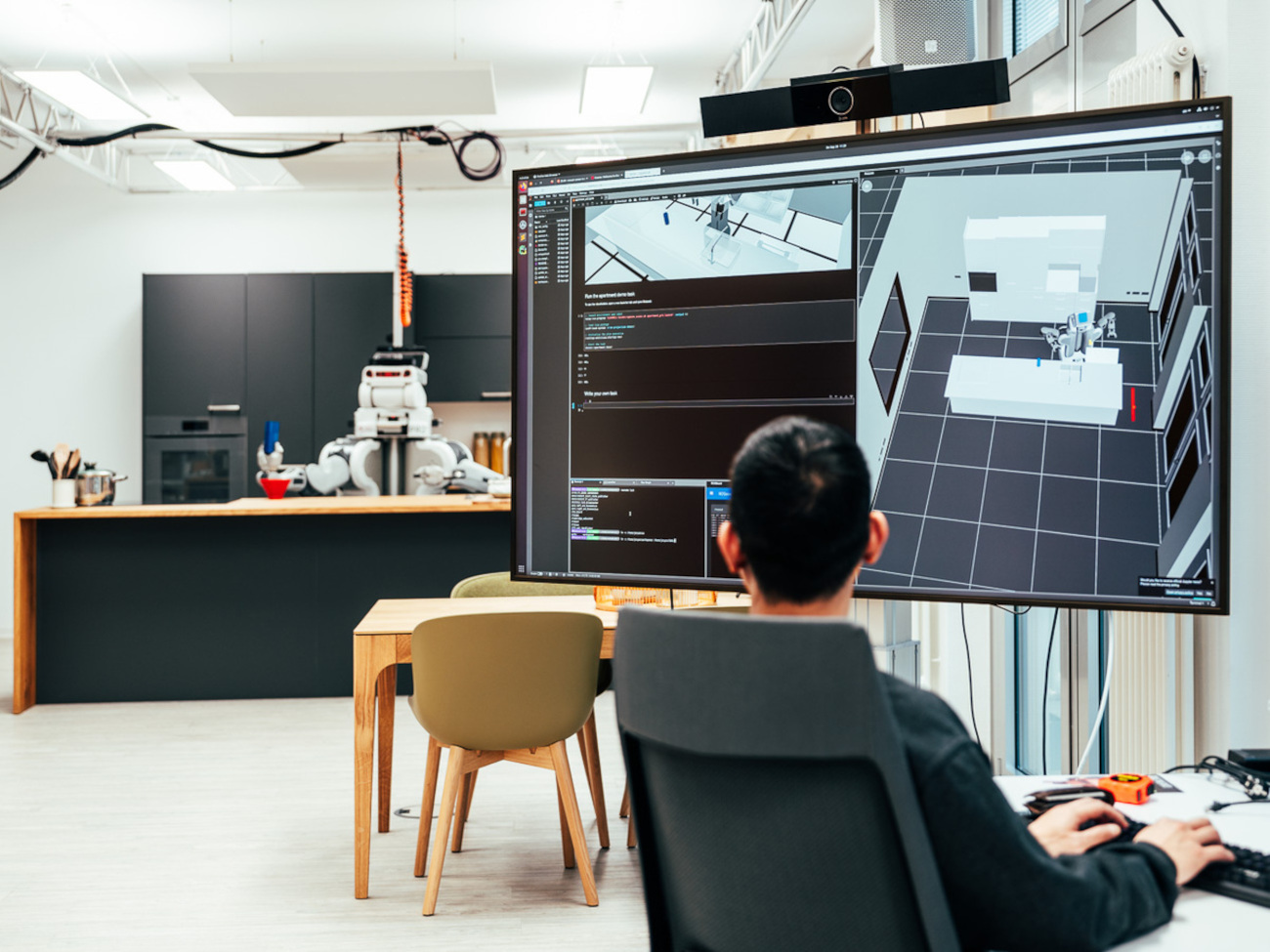
© Lukas Klose / Universität Bremen
Virtual Robotics Lab for Students
The IntEL4CoRo project opens up new opportunities for students
Setting the table or cooking – robots are being programmed to carry out everyday activities like these in a research lab at the University of Bremen. All of the robots and their environments also have digital twins, but until now, these have only been available to researchers. The IntEL4CoRo project is now introducing the virtual lab to students as well.
In the virtual kitchen, the robot is ready to go. A pot is sitting on the stovetop, the robot is holding a bowl of corn in its hand. Some time and several programming instructions later, the popcorn is ready. “This kitchen is one of the virtual environments that students will be able to access in the future,” explains Dr. Jörn Syrbe. He is the coordinator of the IntEL4CoRo project, which is led by Michael Beetz, professor of artificial intelligence within the Faculty of Mathematics / Computer Science and director of the Institute for Artificial Intelligence (IAI) at the University of Bremen. The acronym is short for “Interactive Learning Environment for Cognitive Robotics.” The environment in question is a digital copy of the robotics lab at the University of Bremen. Researchers from all over the world can conduct their own experiments with digital twins of the Bremen robots. Until now, however, this option was not available to students.
“One reason for this is that the virtual lab previously existed only in the form of a computer program,” says Jörn Syrbe. “This program doesn’t run on many students’ computers, for example, because their graphics cards aren’t good enough for it.” In addition, most students do not have a sufficient scientific background in order to work independently with the digital robots. To assist the students in overcoming these hurdles, an interdisciplinary team of researchers from the Cognitive Systems Lab and the Institute for Artificial Intelligence, media educators from the Center for Multimedia in Higher Education (ZMML), and staff from the Virtual Academy of Sustainability are working together on the project. The Federal Ministry of Education and Research (BMBF) is funding the project over a period of three and a half years.
Digital Experiments Right from the Start
As a first step, the project team created a web version of the lab to make it more accessible to students. The researchers then integrated the work with the digital robots into existing courses, such as the “Integrated Intelligent Systems” entry-level course. In said course, students from degree programs such as Computer Science or Systems Engineering learn more about the concept of cognitive robotics. “Cognitive robotics is about developing robots that can decide autonomously how to carry out a particular instruction, such as ‘set the table,’”Jörn Syrbe explains. Unlike industrial robots, for example, which always repeat the same action at a given location, these robots are supposed to respond flexibly to changing situations.
In the Integrated Intelligent Systems course, students learn what prerequisites the robots need to have in order to respond flexibly and how working with them can change our everyday lives. The course deals with questions, such as, what kind of information do robots need in order to be able to plan their actions? How can you program their motion sequences? But also, how can they make our lives more sustainable – for example, by providing everyday assistance to people in need of care? So far, the students have addressed these questions only in theory. As a result of IntEL4CoRo, hands-on experiments with the digital robots were added to the course. A digital textbook guides students through the individual modules and instructs them on working with the digital platform. Students can use these materials to work independently at home. “A tutorial then allows them to discuss their problems and practice programming together,” Jörn Syrbe states. A test run for the new course is scheduled for the coming semester.

© Lukas Klose / Universität Bremen
When Robots Fold Laundry
The web-based student platform is almost identical to the previous version for researchers. Three different lab environments are available: a kitchen, a home environment, and a drugstore. By the end of the Integrated Intelligent Systems course, students will be able to program robots to carry out small everyday tasks in their respective environments – such as putting a carton of milk in the refrigerator or folding laundry. In the future, students will also be able to use the platform for their own independent projects, for example, as part of their bachelor’s or master’s theses. “This could involve programming assistance robots for the elderly which assist humans in cooking spaghetti, for example, or providing ingredients, and then also checking whether the stove is turned off,” Jörn Syrbe outlines.
The IntEL4CoRo team is providing both the virtual learning environment and the learning materials as Open Educational Resources. Jörn Syrbe is currently in touch with various universities around the world that are interested in these resources, which will also make international student research projects possible. In addition, the IntEL4CoRo team has many plans for the University of Bremen. Jörn Syrbe states, “Our vision is to support all robotics courses with our virtual learning environment.”